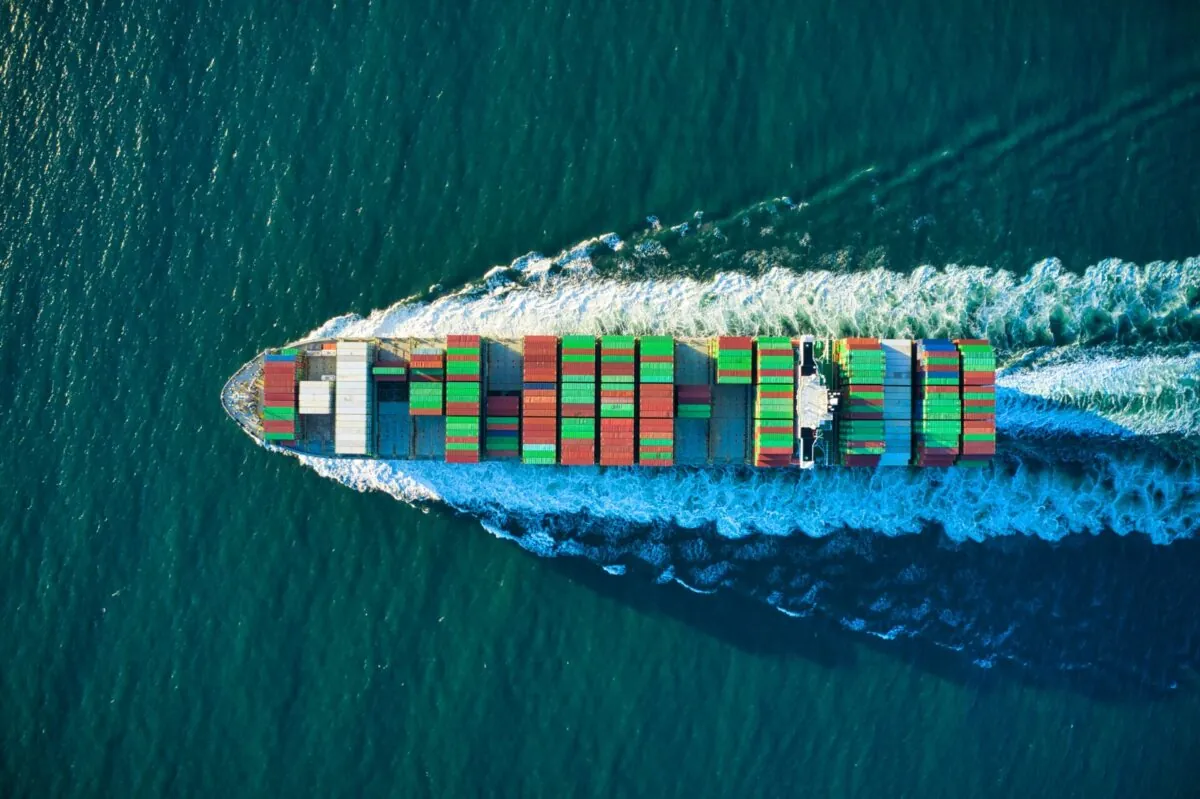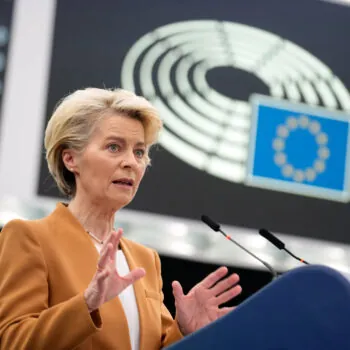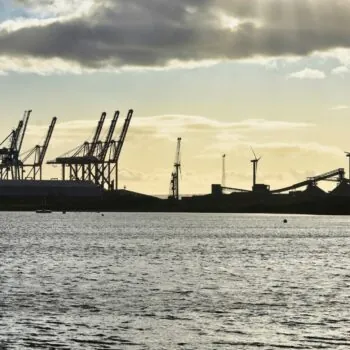The responsibility of the World Trade Organisation (WTO) in tackling global environmental challenges has always been controversial. The 1990s saw a string of WTO cases where trade rules were perceived to trump environmental regulations. The resulting backlash became part of widespread anti-globalisation protests culminating in the infamous “Battle of Seattle” at the 1999 WTO Summit. That meeting ended in collapsed negotiations and tear gas on the street.
The atmosphere was rather more sedate at the WTO’s annual Public Forum in Geneva last week. Environmental issues were again high on the agenda, but the debate was very different this time around. In the 1990s environmentalists were the ones protesting that an over-powerful WTO was interfering in environmental protection. In 2023 it is the trade community that is concerned about the impacts of accelerating climate action on the global trade system.
WTO needs to respond practically and fairly to the accelerating clean transition
Annual clean technology investment is now over $1 trillion a year and outstripped spending on fossil fuel development in 2022. The price of renewable energy and electric vehicles has plummeted, driving up demand and sparking a strategic race between major economies to capture these future industries. A heady mix of climate concern, industrial competitiveness and geopolitical fears over dependencies on strategic rivals has driven ambitious green industrial policies, from the $350bn US Inflation Reduction Act to the EU Green Deal and China’s comprehensive macro-economic green industry support.
Trade diplomats are right to be worried about these trends. While they help accelerate climate action, they could also prevent countries with fewer resources from competing effectively in these fast-growing sectors. This is both unfair and economically inefficient. It is also bad for the climate because it could slow the wider diffusion of clean technologies and reduce incentives for many countries to accelerate their own low-carbon economic transformation. Effective climate action needs a fair global trade and investment system where everyone is actively enabled to benefit from the clean technology revolution.
Action to address these tensions is urgent because these shifts are accelerating. Renewable energy met 88% of global power demand growth in 2022 and will probably deliver over 100% in 2025. Many analysts estimate that 70% of new cars sold globally in 2030 could be fully electric. The International Energy Agency sees demand for all fossil fuels – which make up 40% of global trade flows – peaking by 2030. To meet the most ambitious Paris climate goal, clean investment flows will need to further quadruple by 2030. The economic geography of the twenty-first century will be largely determined by what happens in the next decade.
Trade debate is too focused on low-impact legal issues
These titanic shifts were not the main focus of debate in Geneva. Rather, the EU’s proposals for carbon border adjustments (CBAM) garnered by far the most attention. This is odd because CBAM is a rather modest environmental proposal covering carbon-intensive industries like steel, cement and fertilisers – a small and declining percentage of the European economy. The EU aims to prevent these industries from moving abroad as it increases its domestic carbon prices by putting equivalent charges on imports from counties which do not similarly control carbon emissions. These import charges will only slowly ramp up from the late 2020s coming into full force in 2035. Analysis suggests CBAM will mostly impact a small number of mainly middle-income countries in Europe’s neighbourhood and China, but will be less impactful than many other trade measures already applied in these sectors.
The attention of trade negotiators was drawn by the legal trade principles some consider violated by CBAM rather than the scale of its actual impact on trade flows in the next decade. This focus on legal principle over physical reality is at the heart of the misalignments between trade and environmental issues.
A safe climate requires radical change everywhere, including trade
Climate risks are defined by the absolute amount of greenhouse gases in the atmosphere and how the climate system reacts. Tackling climate change requires shifting the whole global economy away from dependence on fossil fuels in three decades to stop atmospheric concentrations rising. The world has no second chance to achieve this change as “tipping points” in the earth’s climate system would lead to irreversible damage if they are breached. This is an unprecedented project in human cooperation and will not be achieved through “business as usual” politics or institutions. Achieving our collective Paris Goals requires a presumption of radical change everywhere and this includes all international regulatory systems.
Despite the efforts of WTO Director General Ngozi Okonjo-Iweala and some countries, fundamental reforms to tackle the climate crisis have not received strong support from most WTO members. WTO ministers only managed to “recognise” climate change for the first time in their 2022 communiqué, despite all WTO members already being committed to achieving climate-neutral economies by mid-century.
Debate at the WTO often seems to focus more on climate policy success than climate policy failure. But if global temperatures are to be kept to safe levels there will inevitably be impacts on the global trade regime. These should be managed by the WTO to maintain fairness for all but not in ways that slow down the transition. It is a reasonable presumption that this is likely to require changing current trade rules and multiple ideas have already been put forward.
For example, the WTO could modernise the current subsidy control regime to allow support for climate action but also better control any abuses. The WTO could work with environmental bodies to generate transparent and practical standards for measuring carbon “embodied” in traded goods so countries can work better together to avoid emissions “offshoring”. A bold WTO would realise that digital traceability in supply chains on how goods are produced is the future, and work with businesses to make this fair and beneficial for all countries.
But action could go further than these useful tweaks to the system. Some are calling for an explicit “peace clause” eliminating targeted climate subsidies and policies from some WTO disciplines, at least until the rules can be changed to reflect climate priorities. The WTO could work with other parts of the trade and development system to radically increase support to developing countries so they can adjust to and benefit from the shifting net zero economic reality.
Climate policy failure will mean trade system breakdown
The WTO already has a core mandate to support sustainable development, but climate action is also vital to protect the existing trading rules. A delayed and disorderly climate transition could well destroy the rules-based international trade system.
If global temperatures breach the Paris goals the trade system will come under unprecedented pressure from frequent collapses of major food baskets and fisheries, resulting in price shocks and export bans. Physical and financial disruption of industrial and transport infrastructure will shrink supply chains, undermine tourism and leave vulnerable countries economically isolated.
Delayed climate action would result in a “crash policy response” as catastrophic climate impacts emerge. This would cause massive financial system disruption as stranded fossil-related assets unwind and a possible collapse in the insurance and financing systems that trade relies upon.
Failure of cooperation under the Paris Agreement would see unilateral punitive sanctions on countries seen to be failing to control their carbon emissions.
A world of rising climate shocks, humanitarian disasters and climate-driven migration would see countries turn inward and public support for open rules-based trade wither.
These scenarios of climate policy failure are not abstract projections. The 2008/9 food and energy price crisis was sparked by multiple climate-driven impacts and drove protectionist behaviour, supply-chain retrenchment and serious social instability in over 30 countries.
Examples to follow: security and finance sectors
These types of scenarios are already being used by government security planners and financial regulators to build resilience in critical systems they control, and promote an orderly transition to net zero by 2050. Reforms at the UN Security Council and IMF to address these risks are supported by countries at all levels of development, particularly the poorest and most vulnerable. This does not mean that they are becoming “climate organisations” or exceeding their core mandates. It does show that they understand they have strong interests and responsibilities to help drive a successful and orderly climate transition.
International cooperation is difficult and getting harder. The WTO is struggling to handle geopolitical tensions and implement even its current rules. But even though the political barriers to reforming the trade regime are daunting, the alternative of having to respond to climate action failure is far, far worse.
The global financial regime, driven by the G20, has made real progress in addressing climate change since 2015. It still has a way to go but political support for deep reform is broad, as was seen at the recent Paris and Nairobi Summits. Hopefully, trade ministers assembling for the next WTO ministerial summit in 2024 will take heart from this example and build their own agenda for rapid and fundamental reforms that will help drive the unprecedented changes needed to achieve climate safety and global prosperity for all.



